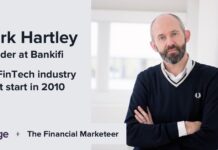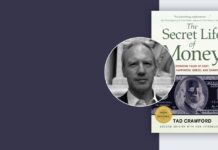Listen to the full interview
Interview with Jacqueline Dewey, CEO at Smart Money People
Jacqueline Dewey comes with a very impressive CV. Not only was she involved with the launch of the very first digital bank but she was also a founder of the firm that made consumer credit scores available for free, something we all now take for granted.
Now CEO at Smart Money People, a firm that has been described as the ‘TripAdvisor for financial services’, Jacqueline talks me through the work she’s doing to make financial services more accessible.
Review sites are nothing new, but as Jacqueline points out, “unlike some of the other review sites, it is only financial services that we look at.”
I started our chat by asking Jacqueline what it is that Smart Money People focusses on doing.
“It’s got two objectives, one is helping customers make more informed financial choices…then on the flip-side of that it’s around partners. We provide what we term ‘rich customer insight’.”
It’s clear straight away from speaking with Jacqueline that there’s a strong desire within the firm to make data accessible and usable.
“[Customers] can search at a brand level, product level and use ‘leaderboards’ depending on what the customers’ level of knowledge is or where they are in their journey.”
Providing rich customer insights
Aside from collecting and sharing consumer reviews, Jacqueline explains that the firm leverages the data it gathers to provide insights for financial teams.
“[The customer insights] are powered by the data we collect through the reviews…to allow them to understand what are the key drivers of their net promoter score.”
The aim is that firms use this data to drive change within their organisation.
Encouraging customers to leave reviews
In order for Smart Money People to provide any value, it first needs to go about gathering customer reviews. I asked Jacqueline how the firm goes about making this happen.
“[The first method is that] the partners we work with will ask their customers to leave reviews…we [also] get a lot of PR and word of mouth which is very key in driving volume.
“We also run three big awards programmes a year; the British Bank Awards, the Consumer Credit Awards and the Insurance Choice Awards and they also drive traffic into the site for people to leave reviews.”
Turning data into insights
One of the most common themes that crop up whenever I run interviews is the challenge of turning data into insights. Being a key part of what Smart Money People offers, Jacqueline explained the process the firm works through.
“We’ve built quite a sophisticated data model that sits behind our business proposition and that analyses all of the verbatim comment and breaks it down into core themes around people, process and product.
“We plot that [data] onto charts…to show what they are strong at and what they are not so strong at. They can then compare that to their peer group and the rest of the market.”
Equally important, as Jacqueline explains is the ability for firms to track their progress; “if you’ve made a change the model allows you to look at that in different periods of time and see how that’s influenced your customer feedback.”
Making financial services more accessible
“There are a lot of products that have previously been what I call the ‘mystery black box’, talked about in very jargonistic terms and actually when you boil it down, it’s quite simple. As an industry, we’ve probably not been very good at doing that.
“[It’s about] stripping away that mystery and giving people information so they can really understand what it is they are looking for, where the best place to get it is and understand what other people think and feel so they can make a conscious choice.”
This, Jacqueline tells me, is what Smart Money People is all about. The mission, Jacquline explains, is about “increasing trust and transparency” within the industry.
An inherent relevancy
I asked Jacqueline how she ensures that Smart Money People remains relevant to its key audiences. “If you look at a customer’s journey, as we go through people evolve and go through different stages in terms of their financial needs, understanding and their abilities to access products. From that point of view, we have inherent relevance to consumers.
“For us it’s all about making sure that we stay up to date with the latest products and looking at new trends and innovations.”
The role of influencers
Interestingly, Jacqueline also points out a new category from the recently closed British Bank Awards. “This year we introduced ‘best financial influencer’ because we’ve seen a growth in the role of influencers in the media.
“We [also] introduced ‘best ethical provider’ and we did children’s accounts as well and those have been incredibly competitive in this year’s awards.”
Increasing awareness
It becomes clear that a key focus for Jacqueline at the moment is on increasing the awareness of Smart Money People and what it can do for consumers and financial firms alike.
“It’s maybe something that hadn’t been done as actively previously so we’re spending a lot of time at the moment on PR and social media and working with partners to develop our proposition and get our name out there.
“For example, we’re partnering at the moment on a product called ‘First Home Coach’ and that’s all about helping first-time buyers. Partnerships in my mind will become more important from that point of view.”
Industry trends
Because of the firm’s unique position as a source of customer opinions in the industry, I asked Jacqueline what trends the firm was seeing when reviewing customer feedback.
“What we’ve seen certainly in the last year with the pandemic is the appreciation that customers have had for the organisations who’ve gone the extra mile for them.
“We do a big mortgage survey every year and that looks from a broker-perspective and the feedback there was frustration with not being able to get hold of lenders.
Being involved with the first digital bank
I asked Jacqueline about her experience with a firm called Egg, which happened to be the first digital bank. “Egg really was an innovative business ahead of its time. Some of the things we were looking at 15 or 20 years ago are really coming to market now.
“It was very early days of digital marketing so we were trying to marry digital with traditional…so it was very challenging but interesting.”
Interestingly, it’s during her time with Egg that Jacqueline says provided her with a lasting passion for innovation and disruption.
“One of the things I learnt there was don’t say ‘no’…if you can’t do something you say ‘I can’t do this, but I can do that.’ It’s a way of thinking that opens up more possibilities.
“They were also great believers in planning for the future…if you actually look at where you want to be in five years time and come back from that it opens up people’s thinking and it makes them, I’ve found, much more creative.”
Providing access to credit reports
Aside from her time spent at Egg developing a digital bank, Jacqueline has also been instrumental in democratising credit reports as a founder at Credit Karma (known as Noddle at the time).
“[I remember] going to the board and saying, ‘we’re going to take your biggest asset and we’re going to give it away for free’.”
The result was the first product to provide consumers with free access to their credit reports.
“Noone has got anything to gain by hiding [information]…with credit reporting now, it’s become the norm whereas [at the time] it was very much one of those ‘black box’ things.”
Advice for marketers
To finish our conversation, I asked Jacqueline for the advice she would offer to others embarking on a career in marketing.
“A piece of advice I was given many years ago [was] don’t label yourself, you’ll build many skills and abilities through your career so use those when you’re looking at options and opportunities.
“I’ve changed roles where that [advice] has really come into its own and allowed me to be more positive in terms of applying for jobs but equally to demonstrate why I’m able to do them.”











